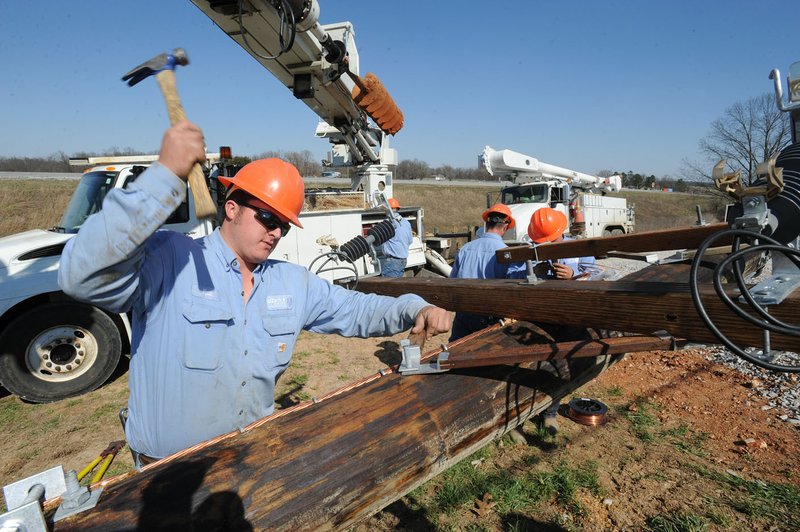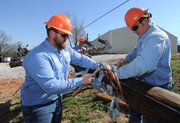Scholarships are opening up for graduating seniors who want to learn technical skills and enter the workforce after high school rather than pursue a bachelor's degree.
The Springdale Schools Public Education Foundation in May will award three new workforce scholarships along with those given to college-bound students.
Application deadlines
April 1 — Workforce scholarships from the Springdale Public Education Foundation
April 14 — Ozarks Electric Cooperative High Voltage Lineman Scholarship
Source: Staff report
"A lot of the impetus started with the chamber making everybody aware we're not churning out enough trades kids," said Chris Stecklein, executive director for the foundation.
The new scholarships are for seniors in the Springdale School District interested in learning a trade of their choice at a vocational school or two-year college.
Scholarships offered by employers for specific trades, however, also provide an avenue for high school students to enter workforce training programs, including students in Siloam Springs and West Fork.
Wyatt Simco, 21, said when he was in his senior year at West Fork High School, he didn't agree with the pressure for all students to get a college degree. Simco was familiar with the trades because his dad works in the railroad industry, and his uncle was a crew chief for Ozarks Electric Cooperative. Simco knew about the pay and benefits for linemen, he said.
"I knew I didn't want to sit at a desk every day," Simco said.
Starting pay is $16 to $17 an hour for a first-year lineman apprentice, said David Dixon, manager of human resources for the cooperative.
Simco received a scholarship from Ozarks Electric that paid for him to spend one year in the High Voltage Lineman Technology program at Arkansas State University at Newport. Simco finished the program that combined in-class work with hands-on activities.
He's in his third year of an apprenticeship, will become a line technician in June and is on track to become a journeyman lineman for the company.
Simco has learned a crew has to work together to finish jobs and do them safely, he said.
"You learn every day here," Simco said. "I like to do aerial work, being in the air and hands on, moving a line or doing work on a hot line."
Ozarks Electric has chosen one graduating senior from among 70,000 member families each year for at least the past 10 years, said Roger Stegeman, job training and safety coordinator. The scholarship is worth $7,500 to $8,000.
The cooperative provides an internship the summer after students finish the training program, and they usually are able to enter the company's apprenticeship program, Stegeman said.
"We have an employee who has a better idea of what's going on on the job over a shorter period of time," Stegeman said.
The scholarships for Springdale students entering the trades are the Springdale Rotary Workforce Readiness Scholarship, the Walter Turnbow Workforce Readiness Scholarship from the Springdale Water Utility Commission and the Weiser Family Workforce Scholarship from Chris and Debby Weiser.
Chris Weiser said he has an ongoing need for welders, who generally earn from $12 to $18 an hour, at his company, JV Manufacturing. The company makes large recycling and waste disposal equipment.
About 50 percent of applicants for jobs with his company have trouble reading a tape measure, he said.
Weiser's family and the Springdale Water Utility Commission, of which he is the chairman, have provided scholarships for college-bound students, but he said he has long been concerned about high school students being prepared to enter the workforce.
Schools have pushed to prepare every child for college, but the reality is only a fraction of high school seniors who go to college finish with a degree, he said.
"The realization that that's not going to happen has been ignored," he said.
Students who complete technical training programs are prepared to enter the workforce and become contributing members of a community, Weiser said.
Karterr Barlow, 18, said the Career Academy of Siloam Springs has opened doors and provided an answer for what he's doing after high school.
Tyson Foods selected Barlow and three fellow seniors for a program that will pay for their travel, food, hotel expenses and fees to attend a four-day industrial ammonia refrigeration operator training at Garden City Community College in Kansas.
The course costs $1,100, said Tim Klinedinst, a recruiting specialist for maintenance and refrigeration technicians for Tyson Foods. The students will have jobs with the company.
"There's a shortage of refrigeration technicians and operators specializing with ammonia," Klinedinst said. "We have to come up with a new strategy. You're not going to find ammonia technicians. You're going to have to create them."
Barlow's last day of school is May 12. His training is set for May 15-19, just before his May 20 graduation.
Senior James Dill, 18, who will attend the same training in June, said, "It's a big opportunity."
The Career Academy opened on the Siloam Springs High School campus in the 2015-16 school year for juniors and seniors. This year's seniors will be the first to complete all components of the two-year industrial maintenance mechanic pre-apprenticeship program, said Mike Rogers, industrial maintenance instructor for the program.
The program packs in what is traditionally four years of the course instruction required for a National Center for Construction Education and Research industrial maintenance mechanic apprenticeship, Rogers said. Students will need two years of on-the-job training after high school to complete the apprenticeship.
"Vocational education is so common sense," Rogers said. "We have more demand for our students than we can supply."
NW News on 03/06/2017


